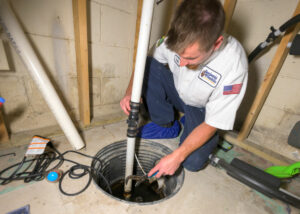How Often To Test or Check Your Sump Pump
Owning a home is kind of like being a parent – it requires lots of love, patience, and checking in regularly to make sure everything is still running smoothly. One area that gets neglected more often than it should?
Your sump pump! That hard-working little guy hangs out in your basement, tirelessly pumping water away from your home’s foundation. But how often do you poke your head down there to test or check the pump?
The Importance of Regular Checks
Monthly Testing
The good news is, that a little preventative maintenance can go a long way in avoiding sump pump failures. We’re talking just a few minutes once a month to quickly test or check your pump.
Simply grab a bucket of water and pour it into the sump pit – this should automatically trigger the pump to kick into action. If it doesn’t start chugging away almost instantly, Houston, you’ve got a problem that needs addressing ASAP.
While you’re at it, keep your ears peeled for any weird grinding noises or excessive vibrating – that could signify something is amiss too. And make sure it’s, ya know, pumping that water out efficiently. A sump pump that’s all bark and no bite isn’t doing you any favors.
Quarterly Inspections
Every 3 months, take things a step further with a mini pump inspection. Unplug the guy, check for any cord damage, give the pit and inlet screen a good cleaning to clear out debris, and make sure that the little float bobber can move around freely. Think of it as your pump’s quarterly tune-up.
Annual Maintenance
Then at least once a year, schedule a full-blown sump pump maintenance day. This is when you’ll want to call in an expert set of eyes – they know all the nooks and crannies to test or check that you might miss. While they’re at it, have them test and inspect out your backup power source too because a sump pump is useless if the power goes out.
Speaking of backups, installing a battery-powered secondary pump or hooking up to your home’s water supply is a smart move in general. It’ll be your salvation if the main one craps out temporarily. Don’t be the person sobbing over a flooded basement because you didn’t have a Plan B!
Signs Your Sump Pump Needs Immediate Attention
If you ever notice anything really out of the ordinary – weird smells, your pump running constantly, visible rust or corrosion – don’t ignore it! Those are big red flags that your pump needs attention like yesterday. Get an expert out there before you’re dealing with serious water damage.
Extra Tips for Maintaining Your Sump Pump
Here are a few additional tips to keep your sump pump performing at its best:
- Keep the Drainage Area Clear: Make sure the exterior drainage area is free of debris and obstructions. This will ensure proper flow and prevent potential backups.
- Install a Water Alarm: Consider installing a water alarm near your sump pump. It will sound an alert if water levels rise too high, giving you time to address any issues before flooding occurs.
- Regularly Check the Discharge Pipe: Inspect the discharge pipe outside to ensure it’s clear of any clogs or blockages. If necessary, use a plumbing snake to remove any buildup and maintain proper drainage.
By following these additional tips, you can further reduce the chances of your sump pump failing and keep your home protected from water damage. Remember, prevention is key when it comes to maintaining your sump pump. So don’t neglect this important home maintenance task and give your sump pump the care it deserves.
Conclusion
At the end of the day, your sump pump is kind of like that friend who’s always got your back in a crisis. The least you can do is return the favor by showing it a little love and care regularly. Do those simple monthly check-ins, keep that pit area clear of gunk, and have a pro give it a tune-up annually. Your pump will keep chugging away and your basement will stay blissfully dry – win/win!


